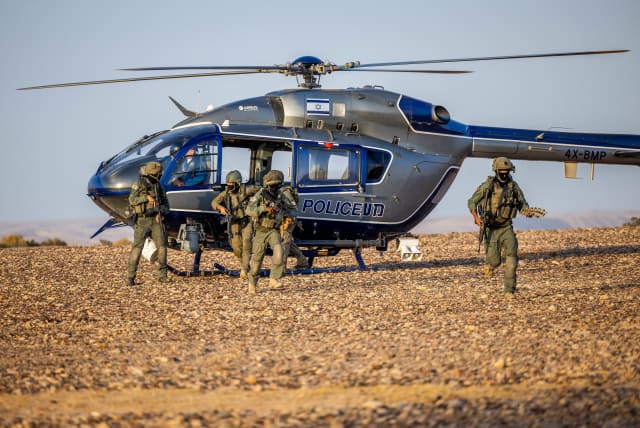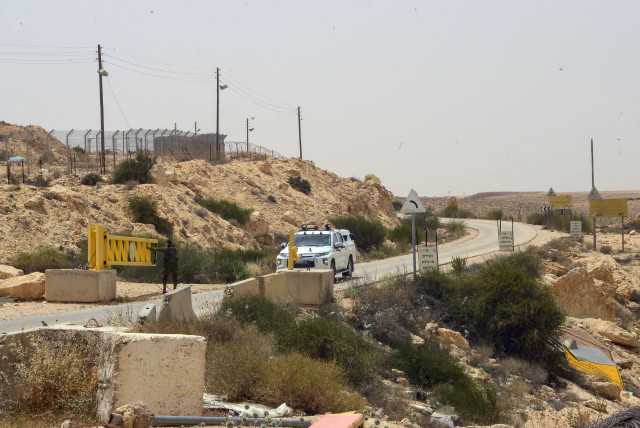The ‘79 Israel-Egypt peace treaty and Sinai border security - explainer

As with all of Israel's borders, there is a delicate diplomatic balance at the Israel-Egypt border, which Israel has been hesitant to change.
Following the attack in the Sinai by an Egyptian border guard who killed three Israeli soldiers on Saturday, Prime Minister Benjamin Netanyahu on Sunday stressed the importance of a joint investigation into security cooperation.
“The incident at the Egyptian border is serious and unusual and will be thoroughly investigated,” he said. “Israel sent a clear message to the Egyptian government: We expect the joint investigation to be exhaustive and thorough.”
“This is part of the important security cooperation between us, which has existed for the benefit of both countries for years,” Netanyahu said. “We will draw all the necessary conclusions regarding our actions along the fence on the southern border, on the Israel-Egypt border.”
As with all of Israel’s borders, there is a delicate diplomatic balance at the Israel-Egypt border, which Israel has been hesitant to change.
The status quo has been dictated by the 1979 peace treaty. But over the years, Israel has made allowances for Egypt to violate aspects of the treaty for its internal security.
Sinai was divided into three different zones
The peace treaty between Israel and Egypt saw Israel withdraw from the Sinai Peninsula and return sovereignty to Cairo. Among many provisions, such as free passage for Israeli vessels through the Straits of Tiran, the Sinai was divided into four zones, which had varying levels of demilitarization for the Egyptian military.
Zone A of the Sinai, on the east coast of the peninsula, allowed up to 22,000 Egyptian military personnel, with 126 artillery pieces, 126 37-mm.-caliber and above anti-aircraft cannons, 230 tanks and 480 armored personnel carriers. In Zone B, in the middle of the Sinai, Egypt would be allowed 4,000 soldiers. Along the western border with Israel in Zone C, Egypt was allowed only civilian police.
In the thin Zone D along the border, Israel was only allowed up to 4,000 infantry and would not be allowed tanks and other armored vehicles.
The treaty included a mechanism to modify some of its terms, according to the Washington Institute for Near East Policy, and as the situation in the Sinai has changed, this mechanism has been implemented.
The Sinai fell into turmoil during and after the Arab Spring. Civil unrest and terrorism grew in the territory, and Israel allowed Egypt to deploy two more battalions of around 800 soldiers in Zone C in early 2011. This was the first time that the Egyptian military had been deployed in the area in 32 years. This deployment was increased weeks later.
Reluctance about changing the terms too much
Israel has been reticent about changing the terms of the treaty too much, but it feared that the Sinai would become a hotbed of jihadist activity. This concern was affirmed with the proliferation of Islamic State forces and cross-border terrorist attacks. After a 2012 attack that killed an Israeli, Israel deployed tanks into Area D.
While both sides are extremely reluctant about rendering the peace treaty irrelevant with changes, terrorist attacks on both sides of the border have forced the states to alter the terms of the deal. This could happen again, depending on what is discovered about the events that led an armed Egyptian security officer being able to kill three soldiers.
A slowly simmering criticism of conditions on the border has been the rules of engagement. Israeli soldiers stationed on the border have complained about the lack of professionalism by Egyptian soldiers, including cases of reckless discharging of weapons that have endangered Israeli personnel.On Saturday, Israeli MKs suggested that there needed to be more relaxed rules of engagement and harsher approaches to security threats on the border.
“We will refresh the regulations, the methods of operation, as well as the means, to reduce smuggling to a minimum and to ensure that such tragic attacks will not happen again,” Netanyahu said Sunday.
The treaty is unlikely to be altered too much, if at all, and it will continue to govern the reality of the Israel-Egypt border. But enough security challenges could threaten the legal infrastructure of such cooperation.
Jerusalem Post Store
`; document.getElementById("linkPremium").innerHTML = cont; var divWithLink = document.getElementById("premium-link"); if (divWithLink !== null && divWithLink !== 'undefined') { divWithLink.style.border = "solid 1px #cb0f3e"; divWithLink.style.textAlign = "center"; divWithLink.style.marginBottom = "15px"; divWithLink.style.marginTop = "15px"; divWithLink.style.width = "100%"; divWithLink.style.backgroundColor = "#122952"; divWithLink.style.color = "#ffffff"; divWithLink.style.lineHeight = "1.5"; } } (function (v, i) { });

